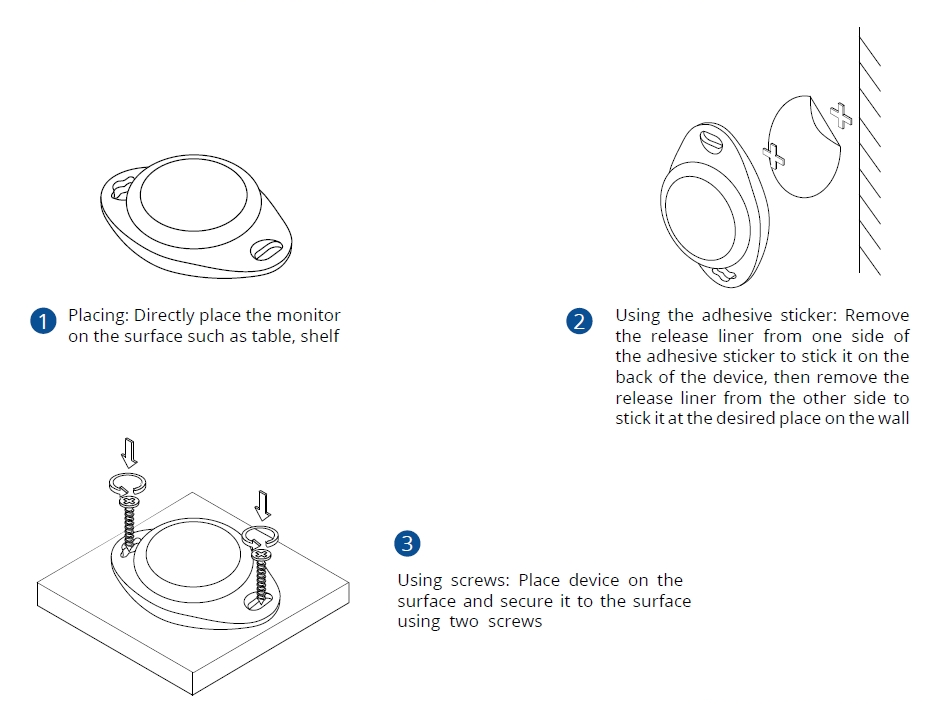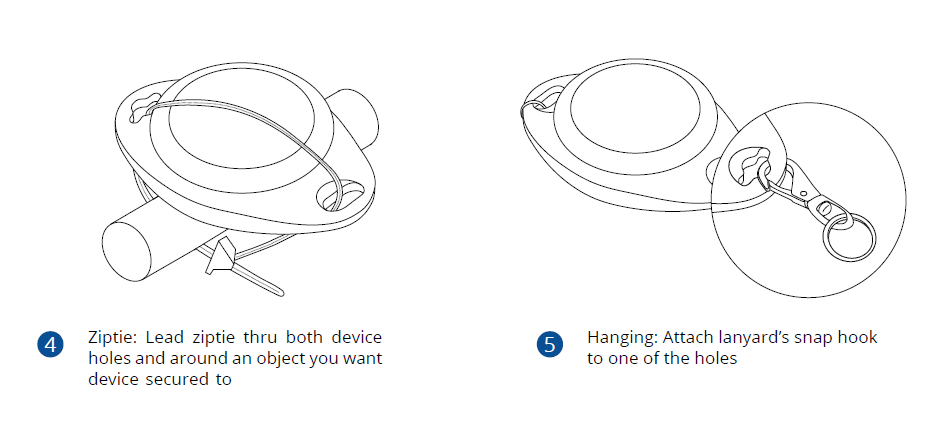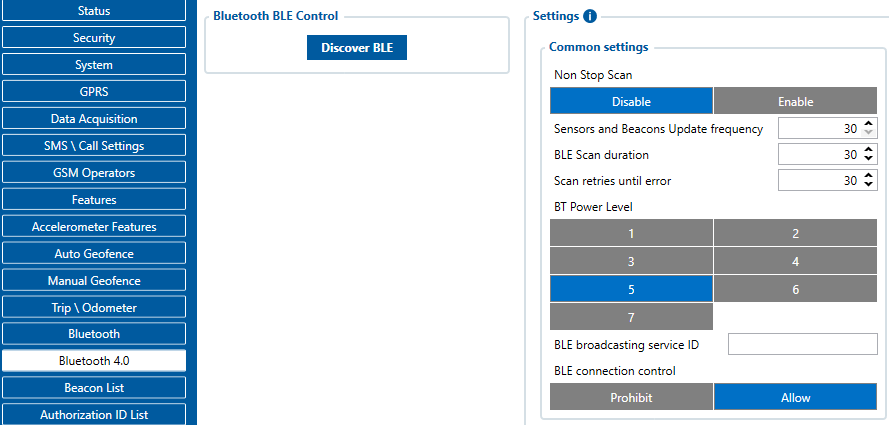EYE BEACON / BTSID1
Introduction
Wireless solutions open up new horizons for your business and help to keep an eye on your assets. Discover our brand-new and certified Bluetooth® Low Energy ID beacon model from Teltonika with robust waterproof casing and a long-lifetime battery. The model designed for a low-cost fast and easy configuration and integration to save precious time, resources, and ensure accountability.
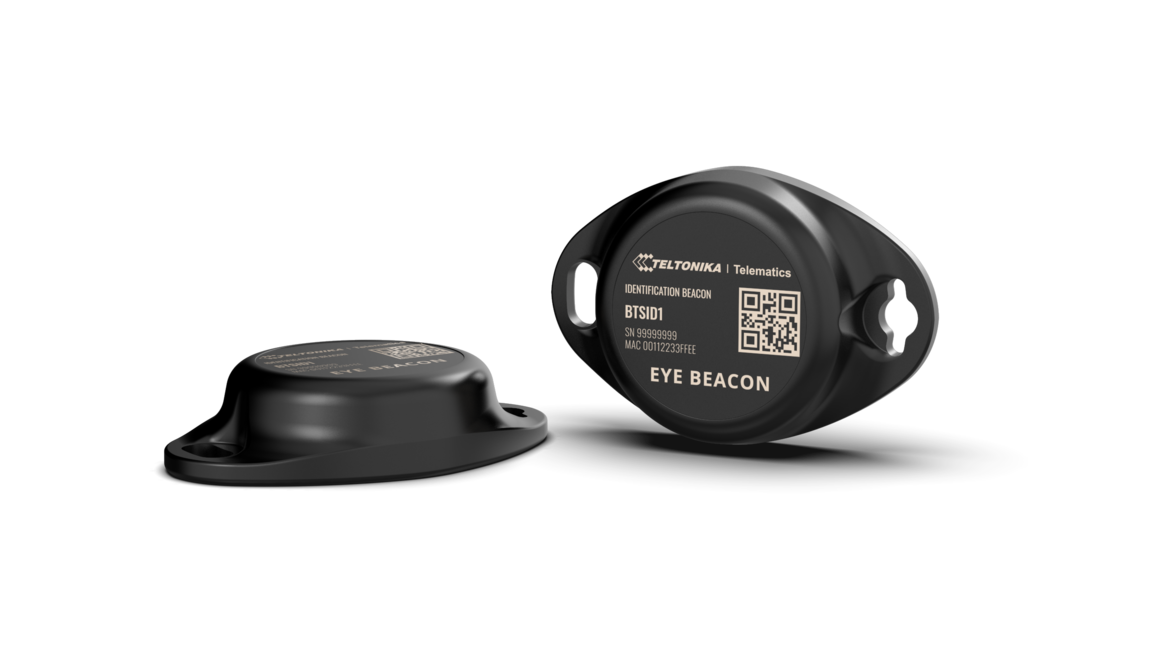
About BTSID1
Perfect for traceability use cases, delivery tracking, monitoring of various movable objects in logistics (trailers, containers), agriculture (tractor attachments), and constructions (tools and inventory). Also, it suitable for indoor tracking solutions for items tracking in warehouses, hospitals, transport hubs and other types of industrial areas. EYE beacon supports iBeacon and Eddystone protocols. The device is fully compatible with the Teltonika firmware platform which provides extended functionality. Configure, scan, and update anytime anywhere with a dedicated Teltonika mobile app.
Product Specification
Features
| Functionalities |
|---|
| Beacon ID, LED |
| Dimensions and weight | |
|---|---|
| Dimensions | 56,6 mm x 38 mm x 13 mm |
| Weight 19 g | 18g |
| Battery and power (not confirmed) | |
|---|---|
| Model | CR2450 |
| Type | Type Lithium, Manganese Dioxide |
| Total Capacity | 600 mAh |
| Replaceable | No |
| Battery life (Tx=2 dBm; interval: 3 s) | 4 years |
| Battery life (Tx=2 dBm; interval: 5 s), default | 8 years |
| Battery life (Tx=2 dBm; interval: 10 s) | 10 years |
| Electronic | |
|---|---|
| Microcontroller | ST Microelectronics BlueNRG-2 |
| Connectivity | |
|---|---|
| Bluetooth® | Bluetooth® 4.2 compliant |
| Range | 80 m |
| Available transmission power levels | Up to 8 dBm |
| Sensitivity | -88 dBm |
| Casing | |
|---|---|
| Protection | IP67 |
| Mounting | Two holes to screw/leash/strip, tape |
| Customization | Custom logo upon request (Special conditions) |
| Environmental Requirements | |
|---|---|
| Operational temperature | -20 °C / +60 °C (-4 °F / +140 °F) |
| Protocols compatibility | |
|---|---|
| iBeacon | Yes
*iOS doesn't show devices with iBeacon protocol |
| Eddystone | Yes |
Dimensions
Value-adding Features
Hibernate mode
Hibernated mode means that the EYE device is OFF when shipping from the factory, preserving battery life. PLEASE NOTE that EYE devices are available in two modes: factory-activated (ON) or Hibernated (OFF). You may order the device version which better suits your needs. Order codes are described on eye page
Value of hibernate mode
Hibernated versions of EYE devices simplify stock management for our partners while maximizing battery life.
1. Accelerated delivery times:
By stocking up on hibernated EYE devices, you ensure readiness to deploy EYE devices with full battery capacity at any moment. This proactive approach provides fastest possible service, increases your reputation for efficiency and positions you as an industry frontrunner, enhancing your competitive edge.
2. Mitigated project risks:
In scenarios where projects encounter unforeseen challenges, our hibernated EYE devices offer a buffer. Hibernate feature allows to safeguard your investments and potential revenue streams. This means that even if projects encounter delays or complications, you can still deploy EYE devices with full battery capacity, ensuring optimal performance when the time is right.
How to activate hibernated eye device?
Attach any magnet to sleeping device and wait for LED to blink.
NOTE: ANY MAGNET CAN BE USED
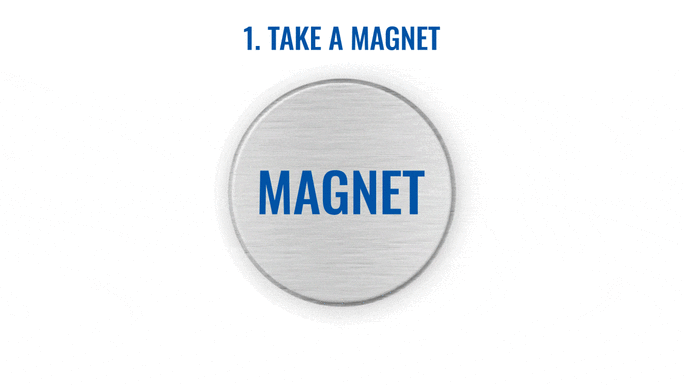
Now device is discoverable, scannable, connectable via BLE.
How to send the device to hibernate mode?
If you want to put the EYE device back to hibernate mode after accidental activation or simply pause its use, you may do that following steps below:
Step 1. While connected and in overview tap "Send device to sleep":
Step 2. Confirm your selection:
Step 3. Wait for EYE App to disconnect:
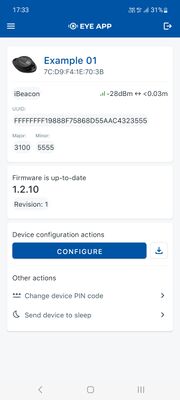
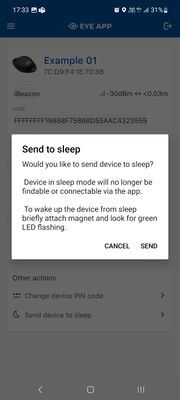
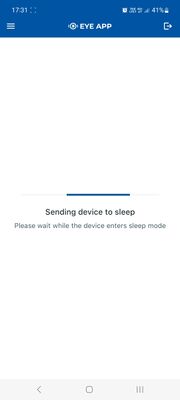
Can All devices hibernate?
1. All EYE Sensors with firmware version starting from 1.2.9.R.8 can hibernate.
2. Only new EYE Beacons bought with order codes that have hardware modification can hibernate standard codes are available in eye page, for special order codes consult your sales manager.
Mounting recomendations
EYE App Configuration
Devices work constantly and are ready to perform out of the box. Default basic Sensor settings are set to:
• Transmitting at 2 dBm power.
• Data advertising at 5 second intervals.
• Eddystone protocol
If you would like to change these settings you will need to:
1) Download and install EYE APP - Teltonika application to change sensor settings.

Eye App Overview
With the application you will be able to scan for visible Teltonika EYE devices, check their statuses, connect for configuration, download it or update the firmware.
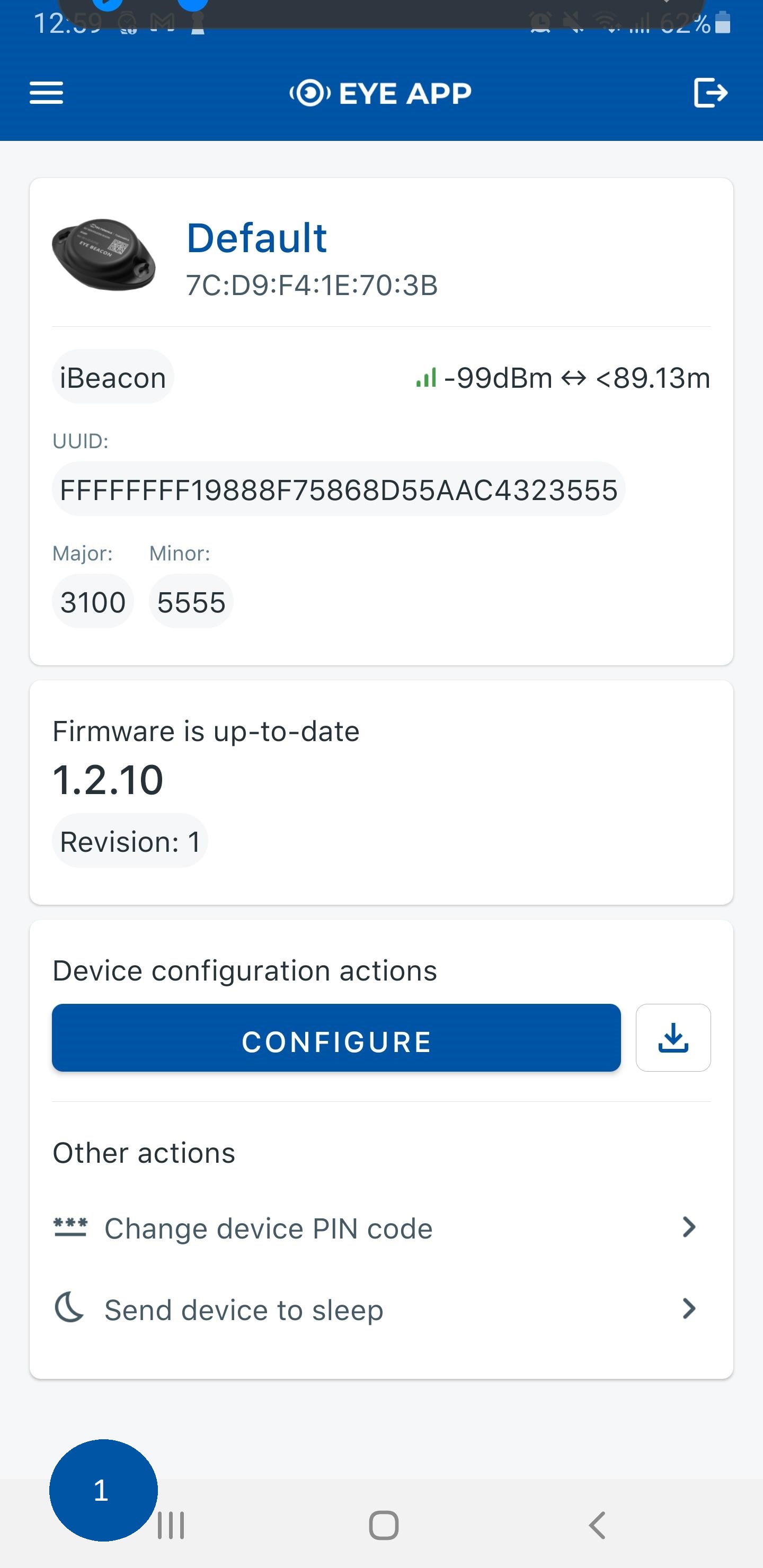
|
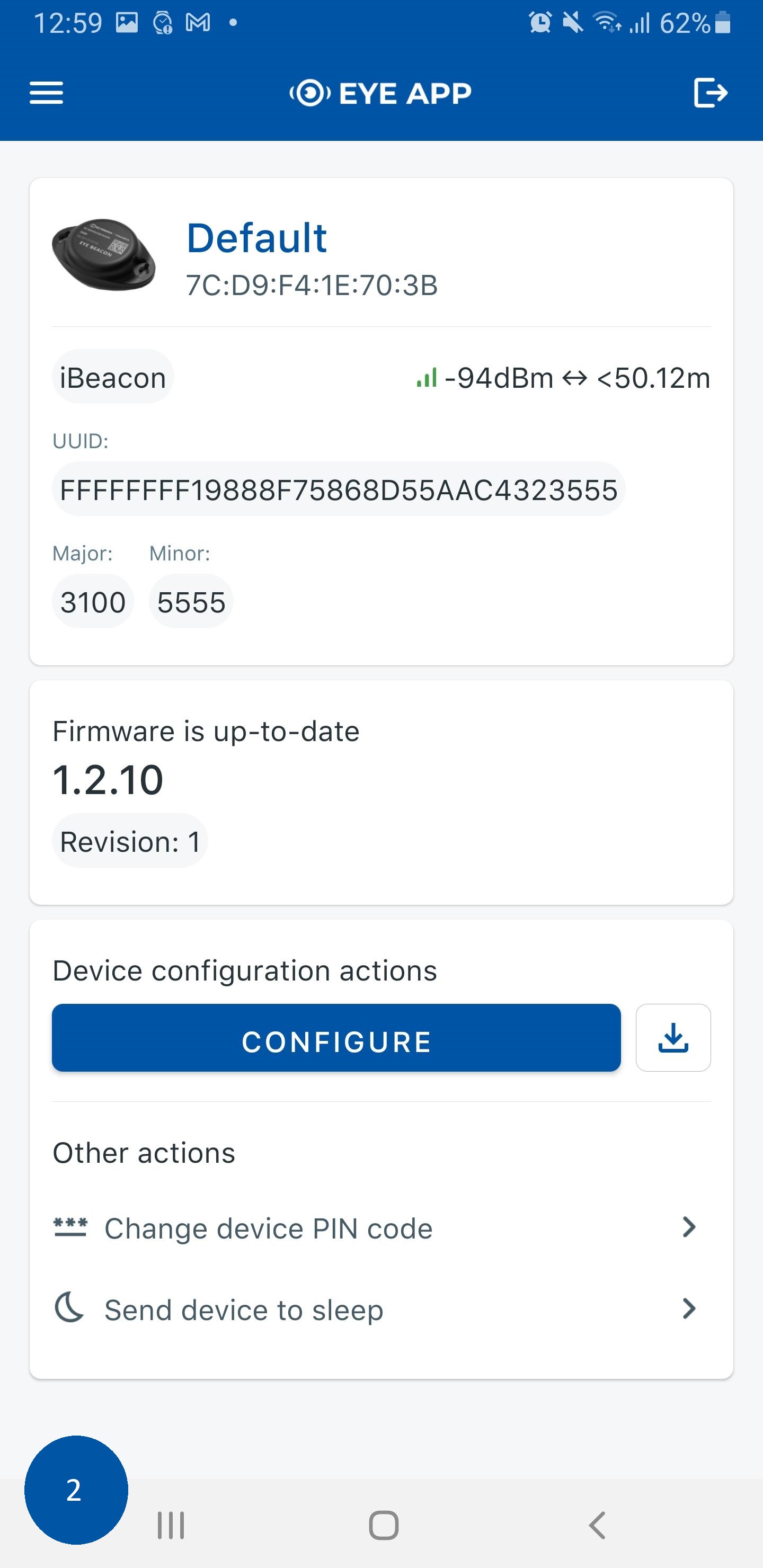
|
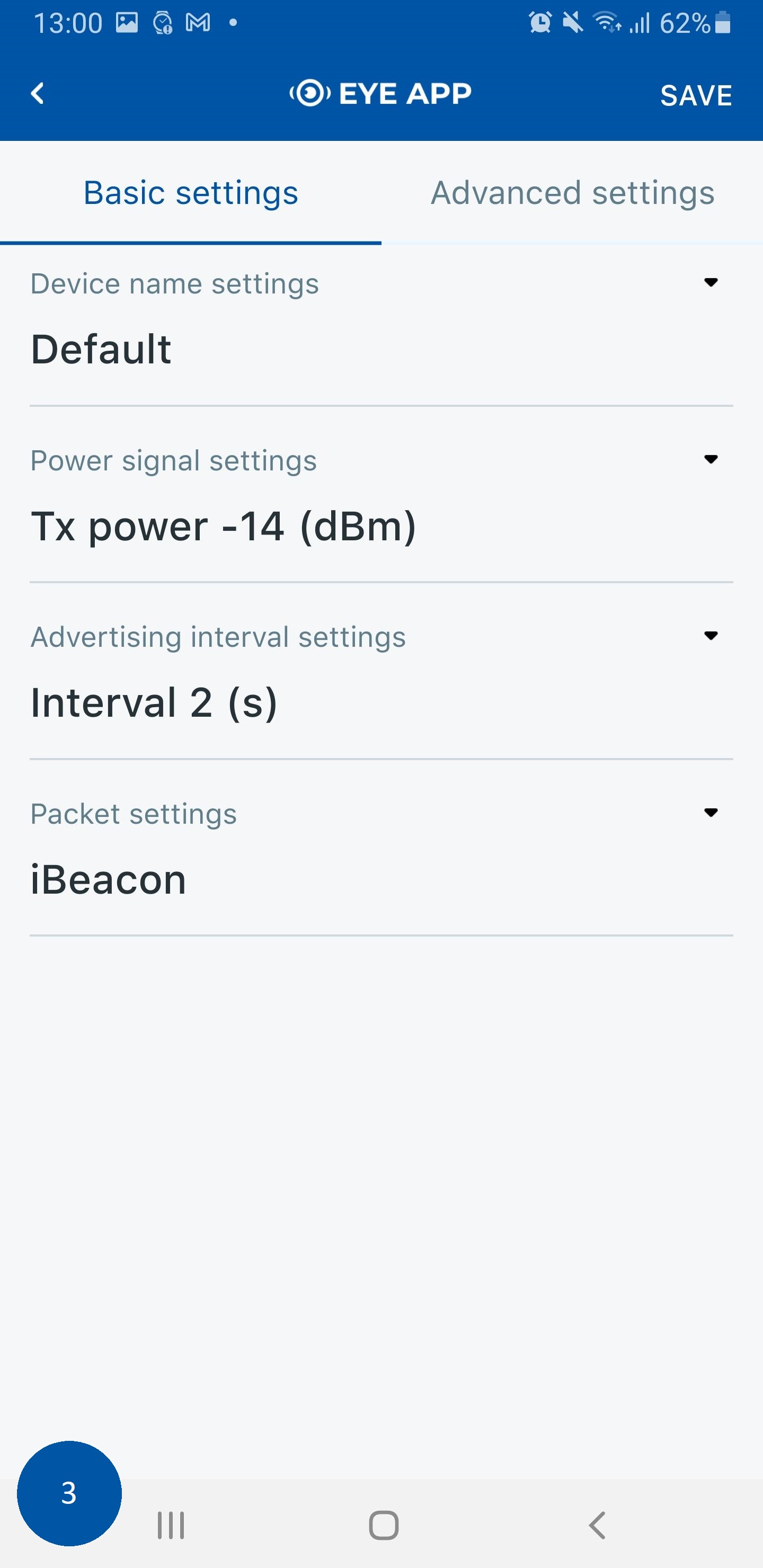
|
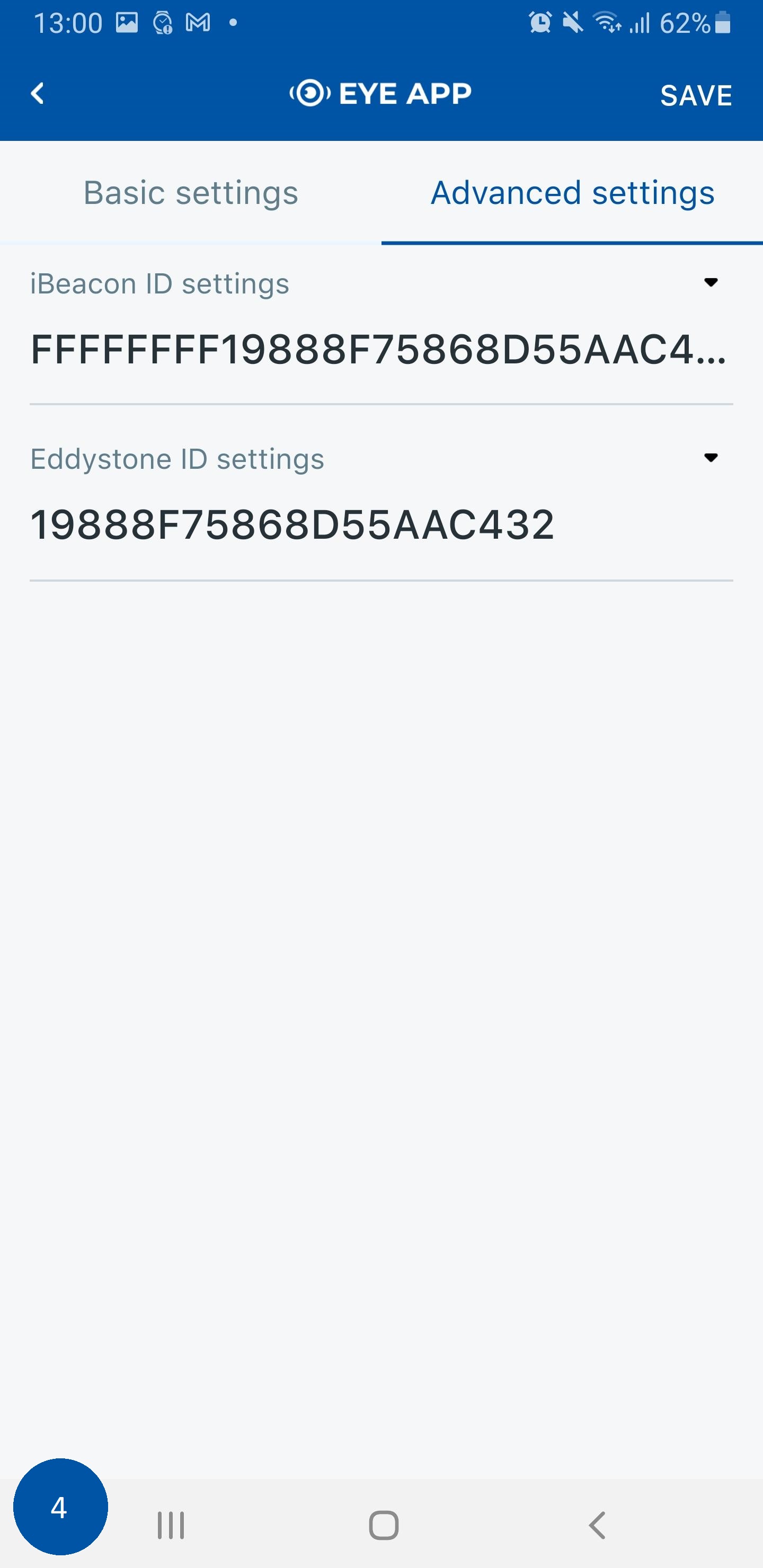
|
 Devices in view: In this window you will see all visible devices. You have options to see devices in Short list
Devices in view: In this window you will see all visible devices. You have options to see devices in Short list ![]() or in default list. When looking at devices in default list you will be able to open Detailed view
or in default list. When looking at devices in default list you will be able to open Detailed view ![]() of devices and check transmitted data statuses. Additionaly if you are looking for specific devices you will be able to use Search
of devices and check transmitted data statuses. Additionaly if you are looking for specific devices you will be able to use Search ![]() function to filter search options. When in this window select a device of your choice to connect and after passing pin code (default pin code is 123456) you will go to device overview window
function to filter search options. When in this window select a device of your choice to connect and after passing pin code (default pin code is 123456) you will go to device overview window
 Overview window: In overview window you can see device details, check firmware version and update if available, go to device configuration settings and download the configuration. If you select to Configure device new window will open with Basic and Advanced settings. Other actions include changing the device PIN code and putting the device to sleep. A device in sleep mode will no longer be findable or connectable via the app. To wake it up, you need to attach a magnet and look for a green LED flashing.
Overview window: In overview window you can see device details, check firmware version and update if available, go to device configuration settings and download the configuration. If you select to Configure device new window will open with Basic and Advanced settings. Other actions include changing the device PIN code and putting the device to sleep. A device in sleep mode will no longer be findable or connectable via the app. To wake it up, you need to attach a magnet and look for a green LED flashing.
 Configure window: In this window you can check and change device configuration settings. In main tab Basic Settings you can change main settings. Change Device name, Power signal strength, Advertising interval and Packet transmission type*. For more settings go to Advanced settings tab to enable various events.
Configure window: In this window you can check and change device configuration settings. In main tab Basic Settings you can change main settings. Change Device name, Power signal strength, Advertising interval and Packet transmission type*. For more settings go to Advanced settings tab to enable various events.
 Advanced configuration window: Beacon information (iBeacon ID*, Eddystone ID). UUID/MINOR/MAJOR parameter can be changed for iBeacon ID*. Namespace ID/Instance ID can be changed for Eddystone ID
Advanced configuration window: Beacon information (iBeacon ID*, Eddystone ID). UUID/MINOR/MAJOR parameter can be changed for iBeacon ID*. Namespace ID/Instance ID can be changed for Eddystone ID
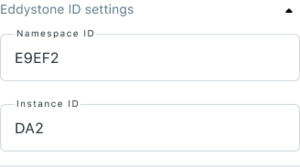
|
*iOS doesn't show devices with iBeacon protocol
FM Tracker Configuration
Teltonika configurator (Base firmware)
If you have firmware / configurator which does not support EYE Beacon tab in Bluetooth® 4.0 section, then you can use Beacon list section of the configurator to scan available EYE Beacons.
Below are short instructions which show how we recommend configuring the device to Enable the Beacon functionality for testing.
Steps to follow according to the visual representation
- In System Settings Enable Codec8 Extended;
- In Bluetooth® settings Enable Bluetooth®, set this setting as either "Enable (hidden)" or "Enable (visible)", otherwise Bluetooth® will be disabled;
- In Bluetooth® 4.0 settings, set Non Stop Scan to "Disable", configure "Update Frequency" and "Scan duration" as 30 seconds. These settings will bring the best results for BLE scanning with our device;
- In Beacon list settings, configure Beacon Detection as "All" and Beacon Record as "Eventual". This will detect all surrounding Beacons and create Beacon records every 30 seconds.
Teltonika configurator new functionalities (Evaluation firmware)
Bluetooth® 4.0
Common settings
- Non Stop Scan - Enable Non Stop Scan feature, the device will try to scan for the sensors all the time if any of them are configured.
- Sensors and Beacons Update frequency - changes sensors temperature/humidity/battery voltage data update frequency. Minimum value: 30s, maximum value: 65535s. Recommended value 30.
- BLE Scan Duration - Sensors data reading time. Recommended value 30.
- Scan retries until error - Scan retries count, till start to show the value as Error '3000' - sensor disconnected. Recommended value 30.
- BT Power Level - Telematics device Bluetooth® power level setting.
- BLE Broadcasting service ID - Telematics device can broadcast configured ID.
- BLE connection control - Connection mode settings. If broadcasting ID is configured, parameter should be set to Prohibit.
Beacon List
Beacons configuration instruction: How to start with FMB devices and Beacons?
![]()
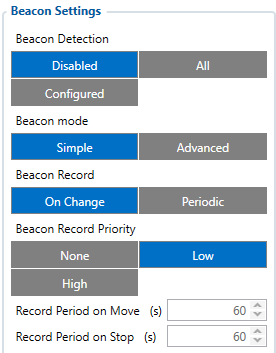
Beacon detection - Parameter controls over all Beacons scanning:
- Disabled – Beacon scanning and transmitting disabled.
- All – Read all visible beacons;
- Configured – Read only beacons set in Beacon List;
Beacon Mode
- Simple - beacon parsing is done automatically (Eddystone and iBeacon protocols are supported).
- Advanced - beacon data capturing can be configured.
Beacon record
- On change - Beacon records are generated only when there are changes in scanned list.
- Periodic - Beacon record generating according to the configured Record Period on Move and Record Period on Stop parameters.
- Beacon Record Priority - When set to None Records will not be generated. Low priority means the Module makes an additional record which will be sent according to configured send period. When High Priority is configured, the Beacon record will be sent immediately to the server as soon as it is generated.
- The New firmware has two Beacon lists, so it is possible to create two separate lists of beacons, standard one with Beacons ID (UUID:Major:Minor, or Namespace:InstanceID) and new one according Beacon Name (by name or prefix, for example all beacons with prefix "ID1" can be saved.)
- Beacon ID - configurator allows to configure beacon ID in iBeacon or Eddystone format in Beacon List.
- Beacon Name - The names of beacons which need to be filtered can be entered. Only the beginning part of the EYE Beacon local name has to match. For example, if in the EYE Beacon name list “EYE_Beacon” is added and the FM tracker detects EYE_Beacon1, EYE_Beacon2, EYE_BeaconXYZ, all these EYE Beacons will be added to EYE Beacon name list.
Both ID and Name filters can work at the same time. If beacon doesn’t match ID filter, but matches the name, it will be added to beacon list. However, Filtering only works Beacon Mode is set to Simple.
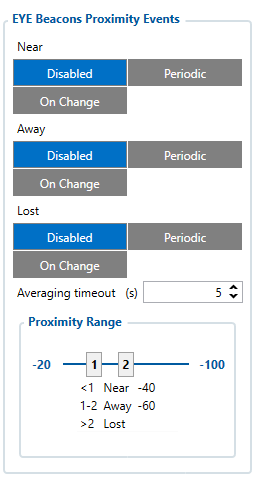
Eye feature mode: Proximity
EYE beacon Proximity events is a functionality which creates three different types of records, depending on the captured Beacons RSSI level. This functionality is only supported with Teltonika EYE beacons.
Proximity events consist of near, away and lost events:
- When EYE beacon RSSI level is below the first configured threshold, the beacon will be added to Near Beacon Record (AVL ID: 10828)
- When EYE BEACON RSSI level is between the second and first configured threshold, beacon is added to Away Beacon record (AVL ID: 10829)
- When EYE Beacon RSSI level is above the second configured threshold, beacon is added to Lost Beacon record (AVL ID: 10831). In the case of EYE Beacon disappearing from the environment and not being detected by the FM tracker anymore, the beacon will be added to Lost Beacon record and will be removed from Beacon list.
Event modes
- Disabled – Record generating is disabled for the selected range
- Periodic – Records will be periodically generated for the selected range, according to the configured record period on move or on stop value.
- On Change – Records will be generated as soon as the Eye Beacon number changes for the selected range.
Averaging Timeout
This parameter specifies how long it will take current RSSI value to reach new RSSI value. For example, current EYE Beacon RSSI value is -40 dBm. FMB captures same EYE Beacon with RSSI value of -60 dBm. If averaging timeout is configured to be 10 seconds, it will take 10 seconds for RSSI value to reach -60 dBm from -40 dBm. Keep in mind that this is assuming perfect conditions and subsequent EYE Beacon RSSI
Eye feature mode: Lost & Found
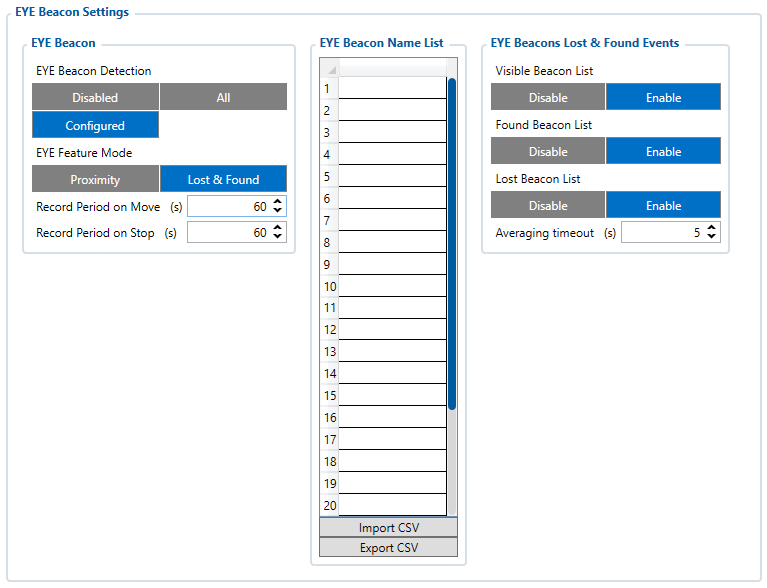
Lost & Found EYE Beacon feature.
Purpose of this functionality is to periodically generate records with all EYE Beacon list (AVL ID: 10828) and create eventual On Change records only when EYE Beacon is lost (AVL ID: 10831) or found (AVL ID: 10829).
Lost and Found Beacon records only include EYE Beacon which was lost or found, not the full Beacon list.
- If multiple EYE Beacons were found or lost at the same time, multiple will be included into the record.
- If Visible Beacon List is enabled, Beacon records containing the list of visible beacons will be generated according to the configured period parameters Record Period on Move and Record Period on Stop
Advanced Beacon protocol is being used to send Lost & Found records.
Note:Same AVL ID’s as for Proximity events are being used, since two features cannot work at the same time.
- AVL ID: 10828 Visible Beacon List (periodic)
- AVL ID: 10829 Found Beacon List (On Change)
- AVL ID: 10831 Lost Eye Beacon List (On Change)
Proximity and Lost & found AVL ID elements have the following structure:
![]()
When Proximity or Lost & Found events are sent, the records will always include Beacon RSSI, Beacon ID, low battery indicator and Battery Voltage.
Below is the mentioned Parameters description:
| Parameter ID | Name | Data type | Description |
|---|---|---|---|
| 0 | Beacon RSSI Level | 1 byte unsigned integer | Received signal strength indication (RSSI) value in dBm.
Hex value must be converted to decimal from signed 2s complement. |
| 1 | Beacon ID | Array | For EYE Beacons that are transmitting using Eddystone protocol: Beacon ID is Namespace , InstanceID (16 bytes)
For EYE beacons that are transmitting using iBeacon protocol: Beacon ID is UUID, Major, Minor (20 bytes) |
| 13 | EYE Beacon Low battery indicator | 1 byte integer | Low battery state measured by EYE beacon; value is either 0 (low voltage not detected) or 1 (low voltage detected) |
| 14 | EYE Beacon battery Voltage | 2 byte unsigned integer | EYE Beacon battery voltage value in mV |
| 15 | EYE Beacon MAC | 6 byte unsigned integer | Device’s MAC address is sent if it's enabled in FMB configuration |
EYE Beacon Protocol overview
Beacon advertising
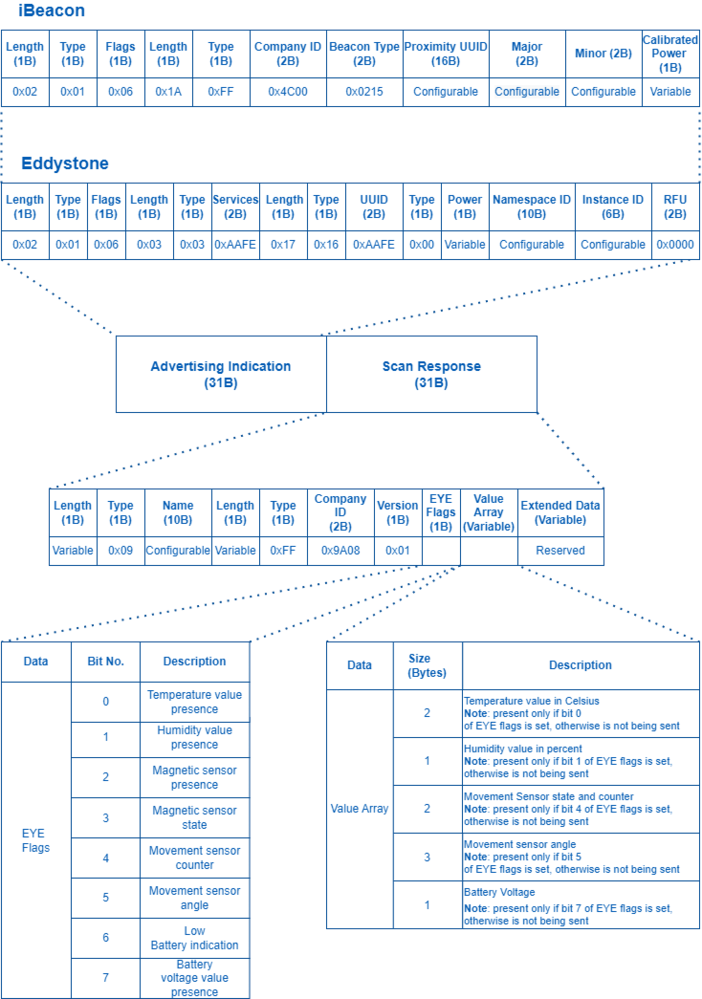
Protocol description
At the highest-level Bluetooth® LE advertising packet consists of Advertising Indication and Scan Response. Both packets can be maximum of 31 bytes in size. Advertising Indication packet is always broadcasted when Scan Response is broadcasted only if Observer device requests it by using Active Scan.
BTSMP1 uses Advertising Indication to send beacon data which can be configured to select between iBeacon and Eddystone protocols or to be disabled at all. In that case, data which is shown as Scan Response in protocol overview will be sent as Advertising Indication without Scan Response following it.
Scan Response is used to send device name and manufacturer specific data. Manufacturer specific data includes Teltonika Company ID (0x089A) and protocol version (0x01). It is followed by Flag Encoded Data (Table 1).
Device Name has the following default value for Beacon – ID1_XXXXXXX
| Data | Size (Bytes) | Description |
|---|---|---|
| Flags | 1 | Each set bit (0-7) means the presence of value (0-7). Bits:
Note: only bolded bits (6 and 7) can have value 1, on BTSID1 |
| Value 7 | 1 | Battery Voltage
|
GATT Characteristics
| Name | Service UUID | Characteristic UUID | Data Type | Min | Max | Default Value | Notes |
|---|---|---|---|---|---|---|---|
| Device Name | e61c0000-7df2-4d4e-8e6d-c611745b92e9 | e61c0016-7df2-4d4e-8e6d-c611745b92e9 | ASCII | 0 | 12 | Unique for each device | - |
| Tx Power Lever | 1804 | 2a07 | SINT8 | -14 | 8 | 2 | Possible values: -14, -11, -8, -5, -2, 2, 4, 8 |
| Protocol Type | e61c0000-7df2-4d4e-8e6d-c611745b92e9 | e61c0001-7df2-4d4e-8e6d-c611745b92e9 | UINT8 | 0 | 4*
|
1 for EYE_Beacon,
4 for EYE_Sensor*
|
0 - iBeacon
1 - Eddystone 2 - EYE Sensor 3 - iBeacon + EYE Sensor* 4 - Eddystone + EYE Sensor*
|
| Activate / Deactivate Sensors*
|
e61c0000-7df2-4d4e-8e6d-c611745b92e9 | e61c0021-7df2-4d4e-8e6d-c611745b92e9 | UINT8 | 0 | 15
(0b1111) |
4 (0b0100) for EYE_Beacon,
15 (0b1111) for EYE_Sensor |
(LSb) bit 0 – Temperature
Bit 1 – Humidity Bit 2 – Magnetic Bit 3 - Movement
|
| Advertising Interval | e61c0000-7df2-4d4e-8e6d-c611745b92e9 | e61c0002-7df2-4d4e-8e6d-c611745b92e9 | UINT16 | 1000 | 10000 | 5000 | miliseconds |
| Sub Advertising Interval | e61c0000-7df2-4d4e-8e6d-c611745b92e9 | e61c0003-7df2-4d4e-8e6d-c611745b92e9 | UINT16 | 20 | 1000 | 100 | Used by repeats, miliseconds |
| Advertising Repeats | e61c0000-7df2-4d4e-8e6d-c611745b92e9 | e61c0004-7df2-4d4e-8e6d-c611745b92e9 | UINT16 | 1 | 10 | 1 | Repeats work only if Advertising Interval is more than 2000 ms and Repeats set to more than 1 |
| iBeacon ID | e61c0000-7df2-4d4e-8e6d-c611745b92e9 | e61c0005-7df2-4d4e-8e6d-c611745b92e9 | BYTE ARRAY | 20 bytes | 20 bytes | Unique for each device | 16 B - UUID 2 B - major 2 B - minor |
| Eddystone ID | e61c0000-7df2-4d4e-8e6d-c611745b92e9 | e61c0006-7df2-4d4e-8e6d-c611745b92e9 | BYTE ARRAY | 16 bytes | 16 bytes | Unique for each device | 10 B - Namespace 6 B - Instance |
| Command | e61c0000-7df2-4d4e-8e6d-c611745b92e9 | e61c0007-7df2-4d4e-8e6d-c611745b92e9 | Command characteristic | ||||
| Password | e61c0000-7df2-4d4e-8e6d-c611745b92e9 | e61c0008-7df2-4d4e-8e6d-c611745b92e9 | BYTE ARRAY | 6 bytes | 6 bytes | 123456 | Always 6 Digits |
| Movement Start | e61c0000-7df2-4d4e-8e6d-c611745b92e9 | e61c0013-7df2-4d4e-8e6d-c611745b92e9 | UINT16 | 0 | 300 | 5 | seconds |
| Movement Stop | e61c0000-7df2-4d4e-8e6d-c611745b92e9 | e61c0014-7df2-4d4e-8e6d-c611745b92e9 | UINT16 | 0 | 300 | 5 | seconds |
| Password Counter | e61c0000-7df2-4d4e-8e6d-c611745b92e9 | e61c0019-7df2-4d4e-8e6d-c611745b92e9 | UINT8 | 0 (counter) | 10 (counter) | 0 | Byte 0 – counter,
Byte 1 and 2 - timeout |
| Master Password (PUK) | e61c0000-7df2-4d4e-8e6d-c611745b92e9 | e61c0020-7df2-4d4e-8e6d-c611745b92e9 | UINT8 | 8 bytes | 8 bytes | MAC address dependency | Byte array |
| Manufacturer sleep (Hibernate mode) | e61c0000-7df2-4d4e-8e6d-c611745b92e9 | e61c0018-7df2-4d4e-8e6d-c611745b92e9 | UINT8 | 0 | 1 | 1 | 0 – sleep disabled,
1 – sleep enabled |
| Activate / Deactivate Sensors | e61c0000-7df2-4d4e-8e6d-c611745b92e9 | e61c0021-7df2-4d4e-8e6d-c611745b92e9 | UINT8 | 0 | 15
(0b1111) |
15
(0b1111) |
(LSb) bit 0 – Temperature
Bit 1 – Humidity Bit 2 – Magnetic Bit 3 - Movement |
| User ADV Spam Duration | e61c0000-7df2-4d4e-8e6d-c611745b92e9 | e61c0022-7df2-4d4e-8e6d-c611745b92e9 | UINT16 | 1 | 300 | 30 | WakeUp Advertising
Spam Duration in seconds |
| RSSI Calibration Value | e61c0000-7df2-4d4e-8e6d-c611745b92e9 | e61c0023-7df2-4d4e-8e6d-c611745b92e9 | INT8 | -100 | 127 | 127 | RSSI value in dBm
127 – Use default calib. table |
| Manufacturer | 180A | 2A29 | BYTE ARRAY | - | - | Not Configurable | Read Only. Ex. "Teltonika" |
| Model | 180A | 2A24 | BYTE ARRAY | - | - | Not Configurable | Read Only. Ex. "BTSID1" |
| Serial | 180A | 2A25 | BYTE ARRAY | - | - | Not Configurable | Not used |
| Hardware | 180A | 2A27 | BYTE ARRAY | - | - | Not Configurable | Read Only. Ex. "Table:1 Volt:325 |
| Firmware | 180A | 2A26 | BYTE ARRAY | - | - | Not Configurable | Read Only. Ex. "1.1.0-beta" |
| System ID | 180A | 2A23 | BYTE ARRAY | - | - | Not Configurable | Not used |
| MAC | 180A | 652143dc-dec6-4fb1-bd46-3e919d2410a6 | BYTE ARRAY | 6 | 6 | Not Configurable | Read Only. ex. 112233445566 -> 11:22:33:44:55:66 |
| Scan Response Data | e61c0000-7df3-4d4e-8e6d-c611745b92e9 | e61c0001-7df3-4d4e-8e6d-c611745b92e9 | BYTE ARRAY | 17 | 17 | Not Configurable | Scan Response Data, see picture for detail view of data structure |
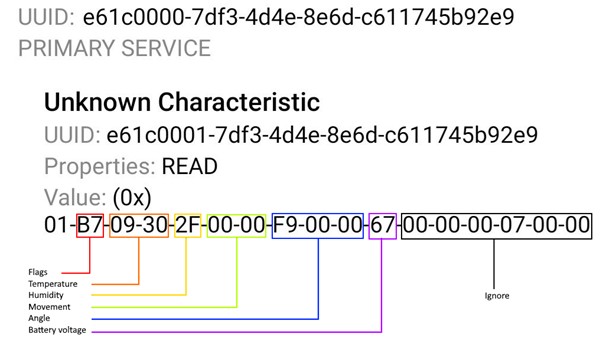
Command characteristic
| Command's name | Data to send | Description |
|---|---|---|
| Write to flash | 0x0010 | Writes set parameters to flash |
| General boot | 0x0011 | Enter boot mode |
| Instant reset | 0x0012 | Software reset |
| Reset after connection | 0x0013 | Reset after disconnect |
| Get hw voltage | 0x0014 | Sets detected hw voltage in response data |
| Keep connection alive | 0x0015 | Resets disconnect timer |
| Restore defaults | 0x0016 | Sets all configurable parameters to default values |
FM packet parsing example
Beacon (AVL ID:385) has the following structure:
| AVL 385 Parsing | ||||||
|---|---|---|---|---|---|---|
| Data part | BLE beacon flags #1 | Beacon ID #1 | Signal Strength #1 | Beacon data #2 | ||
| 1 Byte | 1 Byte | 20/16 Bytes | 1 Byte | … | ||
| First half byte – current data part
Second half byte – total number of data parts |
Bitwise parameter, specify BLE beacon type and parameters.
Two options available are: 21 iBeacon with RSSI 01 Eddystone with RSSI |
Beacon – 20B (UUID, major, minor)
Eddystone – 16B (Namespace, Instance ID) |
Signed 2's complement | |||
Eddystone example with 1 beacon
| AVL Data Packet | ||
|---|---|---|
| AVL Data Packet Part | HEX Code Part | |
| Zero Bytes | 00 00 00 00 | |
| Data Field Length | 00 00 00 40 | |
| Codec ID | 8E (Codec8 Extended) | |
| Number of Data 1 (Number of Total Records) | 01 | |
| AVL Data | Timestamp | 00 00 01 70 1F 9B 3F A9 (GMT: Friday, 07 February 2020 12:23:53.001) |
| Priority | 01 | |
| Longitude | 0F 0E 50 2A | |
| Latitude | 20 9A B4 61 | |
| Altitude | 00 74 | |
| Angle | 00 C6 | |
| Satellites | 0E | |
| Speed | 00 00 | |
| Event IO ID | 01 81 (385) | |
| N of Total ID | 00 01 | |
| N1 of One Byte IO | 00 00 | |
| N2 of Two Bytes IO | 00 00 | |
| N4 of Four Bytes IO | 00 00 | |
| N8 of Eight Bytes IO | 00 00 | |
| NX of X Bytes IO | 00 01 | |
| N’th IO ID - AVL ID. | 01 81 (385) | |
| Length of Variable Length IO | 00 13 | |
| Value of Variable Length IO | 1101E39B606AA38255AA8E460B154E2D0055CF | |
| Number of Data 2 (Number of Total Records) | 01 | |
| CRC-16 | 00 00 00 56 | |
| AVL 385 Parsing | ||||||
|---|---|---|---|---|---|---|
| Data part | BLE beacon flags #1 | Beacon ID #1 | Signal Strength #1 | Beacon data #2 | ||
| 1 Byte | 1 Byte | 20/16 Bytes | 1 Byte | … | ||
| 11 – Data part, 1 Record out of 1 Beacon Packet. | 01 – Eddystone with RSSI | Eddystone – 16B (Namespace, Instance ID)
E39B606AA38255AA8E46 – BLE Beacon Namespace 0B154E2D0055 – BLE Beacon Instance ID |
-49 | - | - | - |
iBeacon example with 2 beacons
| AVL Data Packet | ||
|---|---|---|
| AVL Data Packet Part | HEX Code Part | |
| Zero Bytes | 00 00 00 00 | |
| Data Field Length | 00 00 00 5A | |
| Codec ID | 8E (Codec8 Extended) | |
| Number of Data 1 (Number of Total Records) | 01 | |
| AVL Data | Timestamp | 00 00 01 6B 69 B0 C9 51(GMT: Tuesday, 18 June 2019 08:25:22.001) |
| Priority | 00 | |
| Longitude | 00 00 00 00 | |
| Latitude | 00 00 00 00 | |
| Altitude | 00 00 | |
| Angle | 00 00 | |
| Satellites | 00 | |
| Speed | 00 00 | |
| Event IO ID | 01 81 (385) | |
| N of Total ID | 00 01 | |
| N1 of One Byte IO | 00 00 | |
| N2 of Two Bytes IO | 00 00 | |
| N4 of Four Bytes IO | 00 00 | |
| N8 of Eight Bytes IO | 00 00 | |
| NX of X Bytes IO | 00 01 | |
| N’th IO ID - AVL ID. | 01 81 (385) | |
| Length of Variable Length IO | 00 2D | |
| Value of Variable Length IO | 11216B817F8A274D4FBDB62D33E1842F8DF8014D022BBF21A579723675064DC396A7C3520129F61900000000BF | |
| Number of Data 2 (Number of Total Records) | 01 | |
| CRC-16 | 00 00 3E 5D | |
| AVL 385 Parsing | ||||||
|---|---|---|---|---|---|---|
| Data part | BLE beacon flags #1 | Beacon ID #1 | Signal Strength #1 | Beacon data #2 | ||
| 1 Byte | 1 Byte | 20/16 Bytes | 1 Byte | … | ||
| 11 – Data part, 1 Record out of 1 Beacon Packet. | 21 – iBeacon with RSSI | 6B817F8A274D4FBDB62D33E1842F8DF8 – UUID
014D – Major 022B – Minor |
-65 | 21A579723675064DC396A7C3520129F61900
000000BF | ||
| - | 21 – iBeacon with RSSI | A579723675064DC396A7C3520129F619 – UUID
0000 – Major 0000 – Minor |
-65 | - | - | - |
FM EYE Beacon record parsing example with the new firmware
Below You will find an example on how to parse lost (AVL ID 10831) or found (AVL ID 10829) EYE Beacon record.
Lost & found EYE Beacon records parsing example
| Unparsed data | ||
|---|---|---|
Received data in hexadecimal stream: 000000000000004b8e010000018368952793000f0e54fc209ab05800b300b40e0000
| ||
| AVL Data Packet | ||
|---|---|---|
| AVL Data Packet Part | HEX Code Part | |
| Zero Bytes | 00 00 00 00 | |
| Data Field Length | 00 00 00 4b | |
| Codec ID | 8E (Codec8 Extended) | |
| Number of Data 1 (Number of Total Records) | 01 | |
| AVL Data | Timestamp | 00 00 01 83 68 95 27 93 (GMT: Tuesday, 18 June 2019 08:25:22.001) |
| Priority | 00 | |
| Longitude | 0f 0e 54 fc | |
| Latitude | 20 9a b0 58 | |
| Altitude | 00 b3 | |
| Angle | 00 b4 | |
| Satellites | 0e | |
| Speed | 00 00 | |
| Event IO ID | 2a 4f (10831) | |
| N of Total ID | 00 01 | |
| N1 of One Byte IO | 00 00 | |
| N2 of Two Bytes IO | 00 00 | |
| N4 of Four Bytes IO | 00 00 | |
| N8 of Eight Bytes IO | 00 00 | |
| NX of X Bytes IO | 00 01 | |
| N’th IO ID - AVL ID. | 2a 4f (10831) | |
| Length of Variable Length IO | 00 1e (30 bytes) | |
| Value of Variable Length IO 10831 |
011c0001a40110eb47706aa38255aa96f21a154e2d00550d01000e020bd6 | |
| Number of Data 2 (Number of Total Records) | 01 | |
| CRC-16 | 00 01 2a 4f | |
| AVL ID 10831 Unparsed data | ||
|---|---|---|
011c0001a40110eb47706aa38255aa96f21a154e2d00550d01000e020bd6 | ||
| Parsing the data | ||
|---|---|---|
| AVL Data packet part | HEX Code Part | |
| Constant | 01 | |
| Eye Beacon #1 data length | 1c (28 bytes) | |
| Parameter ID | 00 (Eye Beacon RSSI) | |
| AVL Data | Parameter data length | 01 (1 byte) |
| Parameter data | a4 (Converted to Decimal from signed 2s complement = -92dBm) | |
| Parameter ID | 01 (Beacon ID) | |
| Parameter data length | 10 (16 bytes) | |
| Parameter data | eb 47 70 6a a3 82 55 aa 96 f2 1a 15 4e 2d 00 55 (Eddystone Namespace + Instance ID) | |
| Parameter ID | 0d (parameter ID #13 low battery voltage indicator) | |
| Parameter data length | 01 (1 byte) | |
| Parameter data | 00 (no low battery voltage detected) | |
| Parameter ID | 0e (Eye Beacon Battery voltage) | |
| Parameter data length | 02 (2 bytes) | |
| Parameter Data | 0b d6 (3030mV) | |
NOTE: The record structure for Lost Beacon Record (AVL ID:10829) is the same
Visible EYE Beacons record parsing example with 3 EYE Beacons
Below You will find an example on how to parse visible Beacons list (AVL ID 10828) EYE Beacon record.
| Unparsed data | ||
|---|---|---|
| Received data in hexadecimal stream:
| ||
| AVL Data Packet | ||
|---|---|---|
| AVL Data Packet Part | HEX Code Part | |
| Zero Bytes | 00 00 00 00 | |
| Data Field Length | 00 00 00 89 | |
| Codec ID | 8E (Codec8 Extended) | |
| Number of Data 1 (Number of Total Records) | 01 | |
| AVL Data | Timestamp | 00 00 01 83 a1 c8 fb e3 (GMT: Tuesday, 18 June 2019 08:25:22.001) |
| Priority | 00 | |
| Longitude | 0f 0e 31 0b | |
| Latitude | 20 9a b0 26 | |
| Altitude | 00 e9 | |
| Angle | 00 76 | |
| Satellites | 0d | |
| Speed | 00 00 | |
| Event IO ID | 2a 4c (10828) | |
| N of Total ID | 00 01 | |
| N1 of One Byte IO | 00 00 | |
| N2 of Two Bytes IO | 00 00 | |
| N4 of Four Bytes IO | 00 00 | |
| N8 of Eight Bytes IO | 00 00 | |
| NX of X Bytes IO | 00 01 | |
| N’th IO ID - AVL ID. | 2a 4c (10828) | |
| Length of Variable Length IO | 00 5c (92 bytes) | |
| Value of Variable Length IO 10831 |
011c0001c00110eb577075868d55aa96021b20313800550d01000e020c1c1c0001b60110ef3f3f74868d55aa9aeae91e313800550d01000e020bae | |
| Number of Data 2 (Number of Total Records) | 01 | |
| CRC-16 | 00 00 88 11 | |
| AVL ID 10828 Unparsed data | ||
|---|---|---|
011c0001c00110eb577075868d55aa96021b20313800550d01000e020c1c1c0001b60110ef3f3f74868d55aa9aeae91e313800550d01000e020bae200001a50114faffffff34b6f6aa38255aa9ef619154d0e200050d01000e020ad2 | ||
| Parsing the data | ||
|---|---|---|
| AVL Data packet part | HEX Code Part | |
| Constant | 01 | |
| Eye Beacon #1 data length | 1c (28 bytes) | |
| Parameter ID | 00 (Eye Beacon RSSI) | |
| AVL Data | Parameter data length | 01 (1 byte) |
| Parameter data | c0 (Converted to Decimal from signed 2s complement = -64dBm) | |
| Parameter ID | 01 (Beacon ID) | |
| Parameter data length | 10 (16 bytes) | |
| Parameter data | eb 57 70 75 86 8d 55 aa 96 02 1b 20 31 38 00 55 (Eddystone Namespace + Instance ID) | |
| Parameter ID | 0d (parameter ID #13 low battery voltage indicator) | |
| Parameter data length | 01 (1 byte) | |
| Parameter data | 00 (no low battery voltage detected) | |
| Parameter ID | 0e (Eye Beacon Battery voltage) | |
| Parameter data length | 02 (2 bytes) | |
| Parameter Data | 0c 1c (3100mV) | |
| Eye Beacon #2 data length | 1c (28 bytes) | |
| Parameter ID | 00 (Eye Beacon RSSI) | |
| Parameter data length | 01 (1 byte) | |
| Parameter data | b6 (Converted to Decimal from signed 2s complement = -74dBm) | |
| Parameter ID | 01 (Beacon ID) | |
| Parameter data length | 10 (16 bytes) | |
| Parameter data | ef 3f 3f 74 86 8d 55 aa 9a ea e9 1e 31 38 00 55 (Eddystone Namespace + Instance ID) | |
| Parameter ID | 0d (parameter ID #13 low battery voltage indicator) | |
| Parameter data length | 01 (1 byte) | |
| Parameter data | 00 (no low battery voltage detected) | |
| Parameter ID | 0e (Eye Beacon Battery voltage) | |
| Parameter data length | 02 (2 bytes) | |
| Parameter Data | 0b ae (2990mV) | |
| Eye Beacon #3 data length | 20 (32 bytes) | |
| Parameter ID | 00 (Eye Beacon RSSI) | |
| Parameter data length | 01 (1 byte) | |
| Parameter data | a5 (Converted to Decimal from signed 2s complement = -91dBm) | |
| Parameter ID | 01 (Beacon ID) | |
| Parameter data length | 14 (20 bytes) | |
| Parameter data | fa ff ff ff 34 b6 f6 aa 38 25 5a a9 ef 61 91 54 d0 e2 00 05 (iBeacon UUID + Major + Minor) | |
| Parameter ID | 0d (parameter ID #13 low battery voltage indicator) | |
| Parameter data length | 01 (1 byte) | |
| Parameter data | 00 (no low battery voltage detected) | |
| Parameter ID | 0e (Eye Beacon Battery voltage) | |
| Parameter data length | 02 (2 bytes) | |
| Parameter Data | 0a d2 (2770mV) | |
Safety information
This message contains information on how to operate BTSID1 safely. By following these requirements and recommendations, you will avoid dangerous situations. You must read these instructions carefully and follow them strictly before operating the device!
1. To avoid mechanical damage, it is advised to transport the device in an impact-proof package.
2. In case of malfunction contact your Teltonika account manager or write to the technical support team over the Partner Portal/Helpdesk.
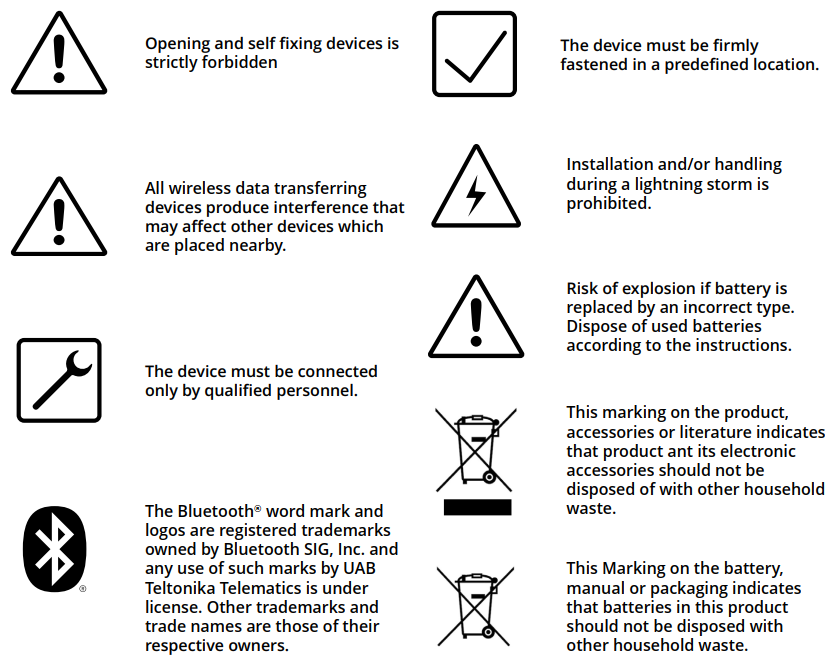
Certification & Approvals
| Certificates | Links | Valid for Model |
|---|---|---|
| E-Mark (EU) | Yes | All |
| FCC (USA) | Yes | All |
| CE/RED (EU) | Yes | All |
| RoHS (EU) | Yes | All |
| REACH (EU) | Yes | All |
| Anatel (BR) (PR) | Yes | All |
| IP rating | Yes | All |
| SIRIM QAS | Yes | All |
| SDPPI POSTEL | Yes | All |
| TELEC | Yes | All |
| ATEX | Yes | ATEX |
Memberships
| Name | Links |
|---|---|
| Bluetooth® SIG | Yes |
| WEEE | Yes |
Nomenclature & Classification codes
| Name | Links |
|---|---|
| EAN | Yes |
| HS | Yes |
| ECCN | Yes |
External Links
Product Page
https://teltonika-gps.com/eye/
Product Change Notifications
The latest Product Change Notifications can be found: Product Change Notifications
Software Errata
Firmware Errata: BTS firmware errata
EYE App Errata: EYE APP errata
Promotional Material
Product Promotional Material Page
Compatibilty with other Teltonika Devices
Teltonika Networks: https://wiki.teltonika-networks.com/view/Bluetooth_EYE_Sensor_and_EYE_Beacon_support
Partner Providers Supporting Software
Frequently asked questions (FAQ)
- Questions about Power and Electrical characteristics
- Questions about EYE Accessory configuration (EYE APP)
- Questions about FMBxxx compatibility with EYE Accessories
- Questions about Protocols
- Other questions (Questions without category)
Documents
| Eye Beacon Datasheet | (Updated on: 2024-03-15) | Eye Beacon ATEX Datasheet | (Updated on: 2024-05-29) | BTSID1 Quick Manual (EN) | (Updated on: 2024-01-17) |
Additional information
For EOL policy please refer to link here.


